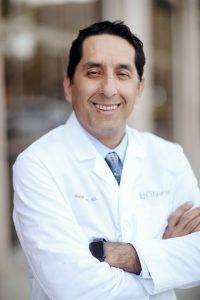
By Misagh Karimi, M.D., City of Hope Newport Beach
As a medical oncologist who treats men daily, I’m committed to helping men be proactive and make their health a priority. This includes speaking with men and their families about cancer screenings and, if they are diagnosed with cancer, the importance of seeing a physician with expertise in their specific cancer type.
June is Men’s Health Month, so here are four key screenings that can detect cancer early or in some cases prevent it from developing in the first place.
Colon cancer: Colon cancer is one of the most preventable cancers, and colonoscopy is the gold standard for colon cancer prevention and early detection. The screening is highly effective at finding and removing precancerous polyps and early-stage tumors. If you are age 45 or older, or if you have a family history of colon cancer or other risk factors, talk with your physician about colon cancer screening. You will need to do bowel preparation the night before, but it’s safe and easy. If your physician wants to you get a colonoscopy, follow through and get one. It could save your life.
Prostate cancer: Prostate cancer is typically detected through screenings — a routine prostate exam and/or a PSA blood test — because symptoms are often absent in the beginning stages of the disease. There are no universal guidelines for prostate cancer screening, so men should speak with their physician to make an individualized decision about whether to undergo screening. This is particularly important for men over age 45. Men in higher-risk groups such as Black men or men who have a family history of prostate cancer should ask about starting prostate screening at an earlier age.
Regardless of age or risk factors, men should contact their physician if they experience sudden problems with urination, erectile dysfunction or pain. Although there is no proven method for preventing prostate cancer, healthy lifestyle choices and screenings can work together to protect a man’s health. Prostate cancer is usually readily treatable and has high survival rates, especially when it is caught and treated early.
Lung cancer: One of the challenges of lung cancer is that that most people with the disease do not experience early signs or symptoms. The good news is that, for high-risk people, research shows a low-dosage CT (LDCT) lung cancer screening will discover lung cancer at an early stage 64 to 85 percent of the time, reducing mortality by 20 percent.
LDCT is recommended for patients who are between 50 and 80 years of age, currently smoke or have quit within the past 15 years, and who have at least a 20 pack-year smoking history. This non-invasive, lifesaving screening is reliable, convenient and comfortable for the patient.
Bladder cancer: Bladder cancer is the fourth most common cancer in U.S. men. Routine screening for bladder cancer is not currently recommended for people of average risk, but physicians may run tests for people who have had bladder cancer before or people who work around industrial chemicals. Potential bladder cancers may be detected early — through urinalysis, cystoscopy and urine tests that look for tumor markers — when people see their physician to address symptoms like blood in the urine. Contact your physician promptly if you experience frequent urinary problems or bladder infections. When found early, bladder cancer usually responds well to treatment.
There’s more good news to share regarding the future of cancer prevention. City of Hope is on the leading edge of studying liquid biopsies that involve a simple blood test. This science will get us closer to stopping many cancers in their earliest stages and making cancer a highly preventable disease.
Healthy lifestyle choices make a difference, too. Eat a healthy diet, quit smoking or don’t start the habit, avoid excessive alcohol consumption and exercise regularly.
For this Men’s Health Month and the years we want you to enjoy in the future, take charge of protecting your health.
Misagh Karimi, M.D., is director of clinical operations at City of Hope Newport Beach Fashion Island, and a medical oncologist specializing in gastrointestinal cancers at City of Hope Orange County Lennar Foundation Cancer Center in Irvine.
For more information, visit https://www.cityofhope.org/locations/newport-beach-fashion-island.




